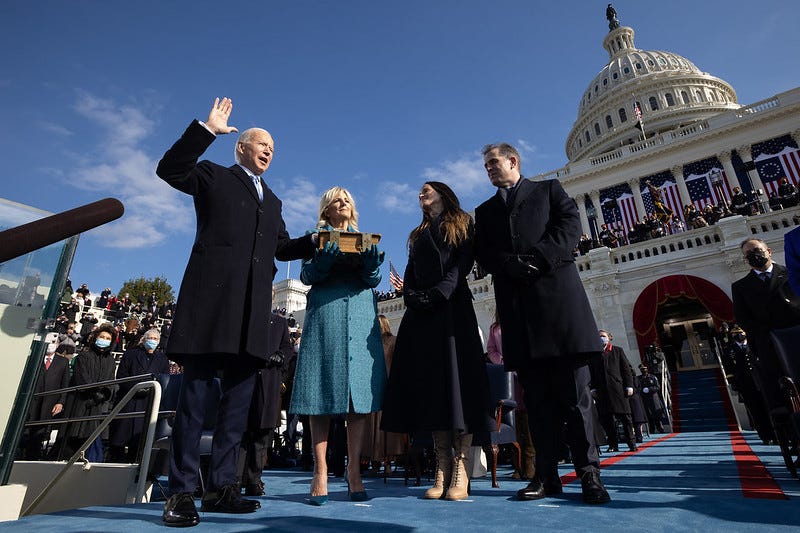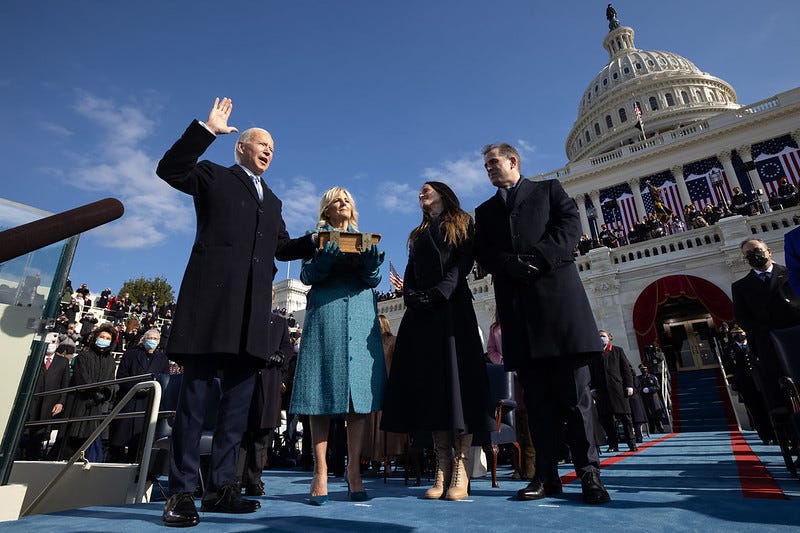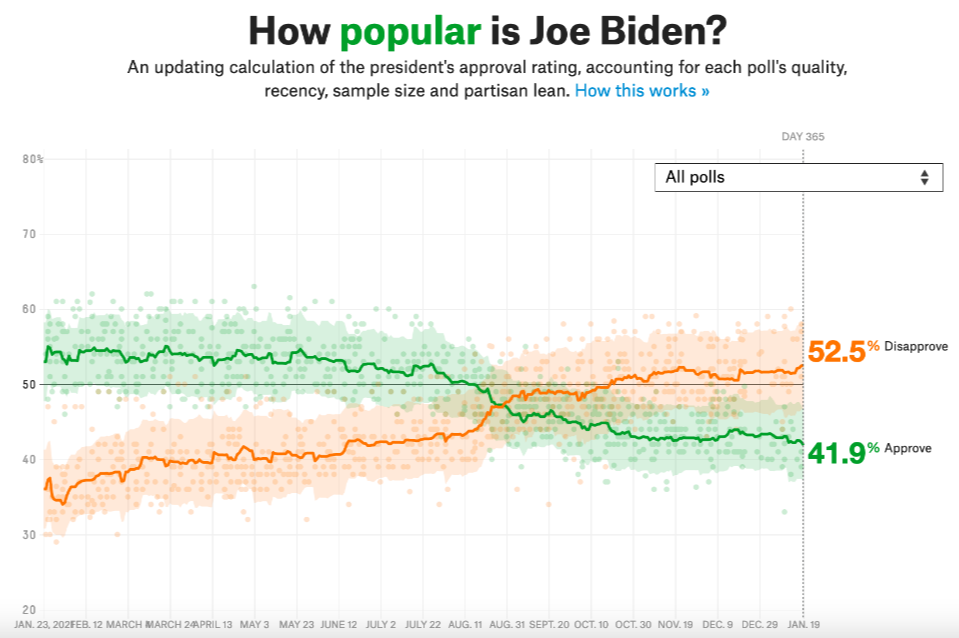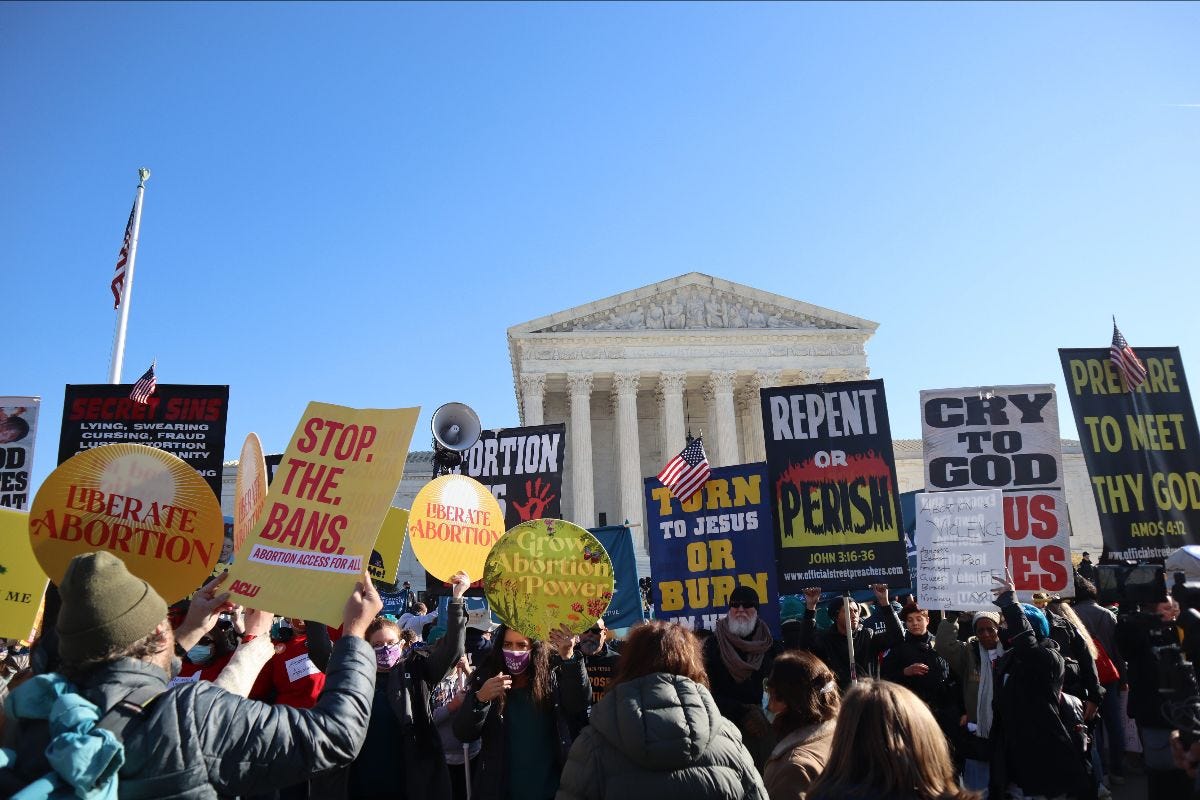Wake Up To Politics - January 20, 2022
Wake Up To Politics: One year of Biden
by Gabe Fleisher
Good morning! It’s Thursday, January 20, 2022. Election Day 2022 is 292 days away. Election Day 2024 is 1,020 days away.
An ambitious start, now stuck in neutral: Sizing up Biden’s first year
Exactly one year ago today, Joe Biden took office as president with sky-high ambitions.
“At this hour, my friends, democracy has prevailed,” he declared in his inaugural address, speaking just two weeks after the January 6 riot. Biden promised to usher in a new age of American unity, while also pursuing a wide-ranging legislative program that was already earning comparisons to those most legendary of Democratic presidents, LBJ and FDR.
Biden would quickly earn praise for his drive to vaccinate the country amid the Covid-19 pandemic, hitting his goal of 100 million shots in his first 100 days early, by Day 58. Within a month and a half of taking office, his first major piece of legislation — a $1.9 trillion stimulus package — had easily sailed through Congress
If the polls are to be believed, the turning point came with the withdrawal from Afghanistan. When Biden entered office, according to the FiveThirtyEight polling average, 53% of Americans approved of his job performance and 36% disapproved. On August 26, 13 U.S. troops were killed by a suicide bombing in Kabul, which would soon become a tragic symbol of a withdrawal marked by chaos.
On August 30, for the first time, the FiveThirtyEight average recorded that more Americans disapproved of Biden’s job performance than approved. It has remained that way ever since. In fact, the gap has only grown: now, 41.9% of Americans disapprove of his presidency, compared to 52.5% who approve. His are the second-worst approval ratings of any president at their one-year mark, ahead only of his predecessor, Donald Trump.
His approval ratings have steadily worsened in response to the ever-growing mound of problems Biden just can’t seem to escape: Inflation at its highest level in four decades. Russia and Ukraine on the brink of war. Democrats in Congress unable to unite behind his signature legislation. And a pandemic that, instead of being over, is now spreading faster than it ever has.
As these issues mount, however, Biden appeared undeterred at a rare press conference on Wednesday. Although one poll showed more Americans giving Biden failing grades than an “A” or a “B” after his first year in office, he gave himself a soaring report card. Asked by one reporter if he had set his sights too high last year, Biden responded: “I didn’t overpromise, but I have probably outperformed what anybody thought would happen.”
Noting the passage of his initial stimulus package and the $1.2 trillion bipartisan infrastructure bill, as well as record-high job creation, Biden went so far as to claim that his successes have been “better than president has ever gotten in the first year.”
Still, even as he was speaking, another symbol emerged of a presidency that — at least for now — seems stuck in neutral. The press conference coincided with Sen. Joe Manchin (D-WV)’s announcement on the Senate floor that he planned to block Democratic attempts to change the chamber’s rules in order to advance a voting rights bill that has recently become Biden’s focus.
Hours later, the Senate marked Biden’s one-year anniversary by voting 52-48 against the attempted rules change, thus killing the bill that the president had called essential to “protect the heart and soul of our democracy.” All 50 Senate Republicans stood united in blocking the effort, joined by Sens. Manchin and Kyrsten Sinema (D-AZ) — the same two Democrats who have held up passage of Biden’s sweeping Build Back Better package.
Biden said he was “profoundly disappointed” with the Senate vote, but promised to “never stop fighting” to secure the right to vote.
So what will Year Two of the Biden era bring? On the policy front, he provided a clue on Wednesday. Biden acknowledged in the press conference for the first time that he planned to shrink the Build Back Better package down to a size approved by Manchin. “I’m confident we can get pieces, big chunks of the Build Back Better signed into law,” he said.
Biden indicated optimism that Manchin and other Democrats would support the package’s promise of universal pre-K for all 3- and 4-year-olds, as well as its $550 billion of investments in clean energy and other initiatives to combat climate change. He also named “two really big components that I feel strongly about that I’m not sure I can get in the package”: an extension of the expanded Child Tax Credit, which lifted millions of children out of poverty before lapsing at the end of last year, and funding to guarantee all Americans two years of free community college.
Similarly, on voting rights, Biden seemed resigned to compromise: “I predict to you they’ll get something done on the electoral reform side of this,” he said, indicating a downsizing in ambitions from the Freedom to Vote: John Lewis Act to a reform of the Electoral Count Act, the 19th-century law Trump attempted to use to overturn the 2020 election results on January 6.

There was another sign from the press conference of what Biden plans to change in the next year: he’s antsy to get out more. Many presidents have spoken about feeling isolated and stuck in the White House, which former President Bill Clinton famously referred to as “the crown jewel of the federal penal system.”
Biden, who has similarly called the building a “gilded cage,” seems to be no exception: when asked to name what he planned to do differently in Year Two, all three of Biden’s responses involved escaping the White House bubble.
“Number one, I’m going to get out of this place more often. I’m going to go out and talk to the public,” he said. Additionally, Biden continued, he plans to seek out “more advice of experts outside, from academia to editorial writers to think tanks.” Finally, he expressed a desire to return to the campaign trail and begin rallying support for Democrats ahead of the 2022 midterms, when his party is historically likely to face bruising results.
Biden said he has not “been out in the community nearly enough,” spending too much time in Washington and not enough time playing to his self-described strengths: the ability to “connect with people, let them take a measure of my sincerity, let them take a measure of who I am.”
In other words, Biden does not believe there is a problem in the size of his ambitions, but in how he’s been selling them. “We just have to make the case what we’re for and what the other team is for,” he explained.
Those comments were a revealing indication of what Biden feels has been lacking in his presidency so far, and how he plans to fix it. Now, with 365 days in office under his belt, he is faced with the challenge of enacting those changes, of rehabbing his presidency from its current low point to the optimistic note he entered on.
To be clear, even if his approval ratings are low right now and his legislative agenda stalled, it remains early — and previous presidents have come back from worse. The one-year mark offers a helpful opportunity to assess a president’s performance so far, but it is far from a final judgment. “President Biden was elected to a four-year term,” White House chief of staff Ron Klain recently said in an interview with Politico, “not a one-year term.”
One more important note from Biden’s presser
“President Joe Biden on Wednesday predicted Russia ‘will move in’ to Ukraine, citing existential concerns by the country's president, Vladimir Putin, even as he acknowledged disunity within NATO over how to respond to a ‘minor incursion.’”
“The candid assessment laid bare the struggle Biden faces in creating meaningful consequences and deterrents for Moscow, which remains closely intertwined economically with the United States’ top European partners.”
“The remark elicited near-immediate outcry in Kyiv, where officials have been meeting with Biden's top diplomat as Russian troops amass on the country's border. High-level attempts to clean-up the comment soon followed at the White House.”
...“‘It’s one thing if it’s a minor incursion and we end up having to fight about what to do and not do,” Biden told reporters at an East Room news conference. “But if they actually do what they’re capable of doing with the forces amassed on the border, it is going to be a disaster for Russia if they further invade Ukraine.”
“‘This gives the green light to Putin to enter Ukraine at his pleasure,’ [one Ukrainian official said], claiming he’d never heard any nuance like this from the US administration before.”
Policy Briefing: Legal
On Thursdays, Wake Up To Politics contributor Anna Salvatore offers a roundup of the week’s top legal news:
The Supreme Court on Wednesday rejected former President Trump’s efforts to withhold documents from the House panel investigating January 6. “This is a thorough rebuke,” tweeted Steven Mazie, the Supreme Court correspondent for The Economist. The justices did not consider the “unprecedented” question of whether former presidents can claim executive privilege over their personal records; instead, they agreed with the lower court’s ruling that even if Trump were president now, the committee would still have the right to see the records.
Only Justice Clarence Thomas noted a dissent. According to the Washington Post, the House select committee will now have access to about 800 pages of Trump’s communications in the National Archives.
A federal appeals court ruled this week that clinics cannot challenge Texas’s restrictive abortion law until a state court reviews it — a process which could take weeks or months. The law bans abortions after six weeks of pregnancy, a time at which many women do not yet know that they are pregnant. Earlier this month, the clinics asked the 5th Circuit Court of Appeals to let their legal challenge proceed through the courts.
“Any further delay,” one of their lawyers said, “would be inconsistent with how the Supreme Court has handled the case,” citing the justices’ December order that the case can partially move forward. In a 2-1 ruling, though, the Fifth Circuit ruled that the Texas Supreme Court must address “unresolved questions” about the law’s enforcement first.
After reports of friction between Justices Sonia Sotomayor and Neil Gorsuch, the two justices colleagues released a rare joint statement on Wednesday. NPR’s Nina Totenberg reported earlier this week that Sotomayor had been participating in oral arguments remotely because she felt uncomfortable being in close proximity to Gorsuch, the only justice who has recently refused to don a mask. Totenberg added that Chief Justice John Roberts had asked Gorsuch and the other justices to wear masks for the sake of Sotomayor, who has diabetes.
In their statement, Sotomayor and Gorsuch said reporting that she had asked him to wear a mask “surprised us” and was “false,” adding: “While we may sometimes disagree about the law, we are warm colleagues and friends.” Roberts, the justice actually reported to have made the request, also issued a statement of denial. NPR has stood by its reporting.
Corrections
In Wednesday’s newsletter, I accidentally wrote that Mark Brzezinski, the new U.S. ambassador to Poland, was the “sister” of Mika Brzezinski, the MSNBC host. Of course, he is her brother. Mea culpa.
Daybook
All times Eastern.
White House
President Joe Biden will receive his daily intelligence briefing at 9:30 a.m. Then, at 11:15 a.m., he and Vice President Kamala Harris will meet with members of the White House task force overseeing implementation of the bipartisan infrastructure package.
At 4:15 p.m., Biden will meet with the President’s Council of Advisors on Science and Technology. Finally, at 7 p.m., Biden and Harris will deliver virtual remarks to a Democratic National Committee (DNC) grassroots event.First Lady Jill Biden and Education Secretary Miguel Cardona will visit Bergen Community College in Paramus, New Jersey, at 11:30 a.m. Biden and Cardona will deliver remarks highlighting the assistance to students in the American Rescue Plan. They will also make an “announcement that will further support student needs and access to resources and services.”
Secretary of State Antony Blinken is in Berlin, Germany, on the third day of his four-day trip to Europe. At 9:45 a.m., he will deliver remarks on Russia’s potential invasion of Ukraine.
White House Press Secretary Jen Psaki will hold her daily press briefing at 1:30 p.m.
Congress
The Senate will convene at 11 a.m. and resume consideration of Holly Thomas’ nomination to be a U.S. Circuit Judge for the Ninth Circuit. The chamber will vote at 12 p.m. to confirm her. Thomas has served as a Los Angeles County Superior Court judge since 2018.
The House will convene at 9 a.m. and resume consideration of H.R. 4673, the Ensuring Veterans’ Smooth Transition (EVEST) Act, which would require the Department of Veterans Affairs (VA) to automatically enroll all eligible veterans into the VA health care system.
The chamber will hold one hour of debate on the measure, consider five amendment, and then vote on final passage.
Congressional Committees
The House Foreign Affairs Committee will hold a roundtable at 9:30 a.m. on “bolstering democracy in the age of rising authoritarianism.” Historians Anne Applebaum, a writer for The Atlantic, and Timothy Snyder, a Yale professor and the author of “On Tyranny,” will testify.
The House Judiciary Subcommittee on Constitution, Civil Rights, and Civil Liberties will hold a hearing at 10 a.m. on “voter suppression and continuing threats to democracy.” A slew of civil rights activists will testify, including Derrick Johnson, the president and CEO of the National Association for the Advancement of Colored People (NAACP), and Sherrilyn Ifill, the president and director-counsel of the NAACP Legal Defense Fund.
The House Select Subcommittee on the Coronavirus Crisis will hold a hearing at 3 p.m. on state responses to the Omicron variant. Govs. Jay Inslee (WA), Jared Polis (CO), and Pedro Pierluisi (PR) will testify, along with Washington, D.C. Mayor Muriel Bowser.
Courts
The Supreme Court will announce opinions at 10 a.m.






